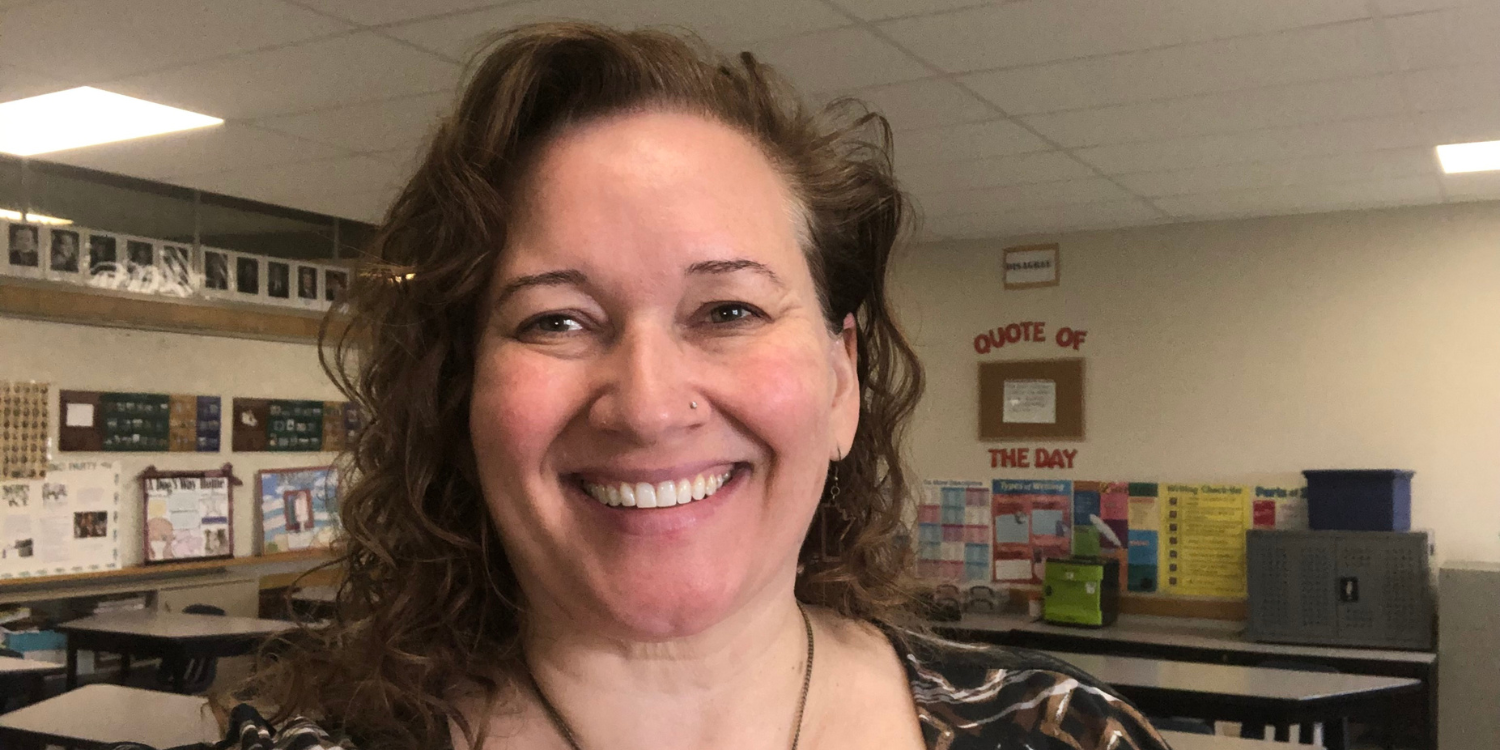It was a volunteer experience that convinced Elena Wiens she wanted to become a teacher. Twenty-five years ago, she began her involvement with Villa Rosa, an organization that provides support for pregnant youth and their babies, which included working with the art program and teaching drama.
“The organization taught me that I can make a positive impact on the world by beginning with the individual,” says Wiens, who today sits on its Board of Directors. “And somebody’s life direction can change completely with a good education.”
As an educator, her proudest accomplishments are the stories from students who have faced struggles and been empowered at school: the new immigrant who immersed themself in learning about Canada’s political system and ran for office as an adult; the student who found agency working for something bigger than themself through Student Vote and graduated high school against the odds; the Indigenous student who developed their voice and shared their experiences in the context of a supportive classroom community.
“They are the reason I do what I do,” Wiens says.
When it comes to democracy education, a question that guides her approach is, “What does it mean to be an active citizen within our community, within our school community, within our classroom?”
A teacher for two decades, Wiens has been using CIVIX materials since her first opportunity, the 2004 federal election. That year a colleague asked her to take the lead on Student Vote. “I remember thinking, ‘This has to be a big deal. We have to make it a whole school thing. We have to get everybody involved and we have to get the students running it’,” she recalls.
Immediately hooked, she has since led Student Vote for every election at the federal, provincial and municipal levels — never missing one. It is now a major event, with Grant Park High School polls often open from 8-4 on Student Vote Day and as many as 90 students running the election.
It’s absolutely key to get students out of school, and experience their learning authentically in the real world.
Wiens is now Social Studies’ department head, and she believes learning should be relevant and experiential. An exciting teaching moment occurred in June 2023, when she and her students were invited to Manitoba House, the official residence of the Lieutenant Governor, Anita Neville, who, with Premier Heather Stefanson, officially welcomed Governor General Mary Simon to Manitoba.
“It’s absolutely key to get students out of school, and experience their learning authentically in the real world,” Wiens says. “The years after they leave my classroom they will pay attention and be engaged in what happens at these locations, to these people, and in these roles, because they have personal experience connected to them.”
Her overall approach to citizenship education is multi-faceted and cross-curricular. A key pillar involves creating a safe environment for students to discuss difficult topics, one in which they can understand a variety of perspectives and negotiate differences.
Her go-to discussion activity is Four Corners, which is part of CIVIX’s PoliTalks program. Each wall is designated with a stance: agree, disagree, in-between, and undecided, and students move around the room (or not) based on what others say.
The student-led topics range from the serious (’Should government pay for gender reassignment procedures?’) to the lighthearted (‘Is it acceptable to cook rice in the microwave?’).
“I think Four Corner discussions are an extremely effective tool because the students who don’t want to talk still participate because they do it physically,” says Wiens. “Even though they may be too scared or too shy to raise their hand, they’re still standing in a spot or moving around the room.”
Wiens undertakes a broad range of activities to support citizenship, including inviting MPs to her classroom through CIVIX’s Rep Day programs. Last year, her school hosted Jim Carr, shortly before the Federal Liberal Cabinet minister passed away. Wiens said Carr exemplified the curious and respectful civic discourse she aims to foster in her classroom.
“In the news, politics gets sensationalized a lot. And that divisiveness is so present. Jim Carr was not like that at all,” she says. “He demonstrated and invited a shared ideal of respecting all perspectives and valuing everybody’s input.”
And the students benefited from the experience. “The kids were so engaged, and so well prepared for the event. We had several Gr. 9 classes involved and there wasn’t one kid that wasn’t totally into it.”
The relationship between informed citizenship and media literacy is also a significant concern for Wiens who teaches a news literacy unit using CIVIX’s CTRL-F program and has students create their own news broadcast.
“Students need tools to navigate the flood of information they are being exposed to,” she says. “And they also need to understand the responsibility that they have to use these tools to be informed citizens.”
Ultimately, Wiens sees the classroom as something of a microcosm where democratic participation and discourse can be fostered. “Canada’s multi-party system is meant to be a discussion, not a debate,” she says, “Where we all bring our ideas to the table, together for the benefit of all.”
At a Glance
Name: Elena Wiens
Location: Winnipeg, Manitoba
Grades Taught: 9-12
Subjects Taught: Social Studies, English, History, Drama
Years Teaching: 20
Years Involved with CIVIX: 19
CIVIX programs used: Student Vote, Rep Day, CTRL-F, PoliTalks
Key Motivation: “‘Economic positive externalities’ — we all benefit from a next generation of thoughtful and educated citizens that listen to each other and discuss issues with each other in a thoughtful way with discernment.”
